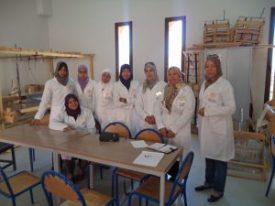In 2016, Oxfam Italia, IUCN, ILEIA and several Bedouin organisations engaged in a joint documentation process in the Middle East.
Twenty stories

The first stage was a “sandwich” training consisting of two workshops and a field-based documentation exercise in between. The aim of the first workshop was for the participants to better understand the documentation process and to do some practical exercises; in the second workshop they started writing down their own case story.
At the end of the second workshop, all participants had submitted a draft article. These articles went through a final editing and translation process and were then published, both in Arabic and in English. All participants wrote their own story; together we had a rich harvest of twenty cases that were compiled into a booklet: Growing hope in Jordan, the Occupied Palestinian Territory and Egypt: Stories from the field.
Enthusiasm
Participants in this documentation training were active and motivated as can be seen from the fact that all of them were keen to write their own case story. Although the writing process was challenging as it was both in English and Arabic, the enthusiasm of participants, working toward a written output, helped to reach the goals of the workshop. Participants realised that a lot can be gained from documentation: “The booklet has like twenty stories, but there are hundreds and hundreds.”
Listening to pastoralists
In December 2016, ILEIApublished “Listening to pastoralists“, a special edition of Farming Matters. This issue has a section with articles from the Middle East, four of these documented in the context the RBGP documentation project. It also has articles from other parts of the world, interviews, columns and a thematic background article.
This issue of Farming Matters appeared in English and Arabic. Both magazines and the booklets were launched during the Closing Event of the project “Food Security Governance of Bedouin Pastoralist Groups in the Mashreq” that took place in Amman on 20 th February, 2017.
Lessons learnt
Throughout the year we have seen a high level of ownership among the participants. They took pride in their stories, while confidence and self-esteem in the process of writing. In our view this is the most important result of this project. The challenge ahead is to create opportunities for capable field documenters to become trainers themselves and coach others in writing down their experiences.
